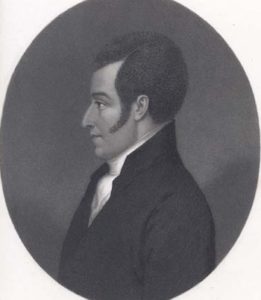
Daniel Coker
*Daniel Coker’s birth is celebrated on this date, c-1780. He was a Black minister and publisher.
He was enslaved as Isaac Wright in Baltimore, or Frederick County, Maryland, to Susan Coker, a white woman, and Daniel Wright, a Black slave. Under a 1664 Maryland slave law, Wright was considered a slave as his father was a slave. During the colonial period, Maryland had added additional restrictions on unions between white women and Black slaves. Under a 1692 Maryland law, white women who had children with slaves would be punished by being sold as indentured servants for seven years and binding their children to serve indentures until the age of twenty-one if the woman was married to the slave and until age thirty-one if she was not married to the father.
Growing up in a household with his half-brothers, Wright attended primary school with them as their valet. A white half-brother was said to have refused to go to school without him. As a teenager, Wright escaped to New York. He changed his name to Daniel Coker and joined the Methodist Episcopal Church. Coker received a license to preach and returned to Baltimore. He passed as his white half-brother and friends finally helped purchase his freedom from his master to secure his legal status.
He could teach as a free black at a local school for black children. By this time, Baltimore was the center of a growing population of early Freedmen. Generally, free people of color, including many, manumitted after the Revolutionary War. In 1802, Francis Asbury ordained Coker as a deacon in the Methodist Episcopal Church. He actively opposed slavery and wrote pamphlets in protest. 1810, Coker published the pamphlet Dialogue between a Virginian and an African minister. It is noted for its literary quality and because it was one of the few protest pamphlets "written and published in the slaveholding South."
While working at Sharp Street Church, Coker began to advocate for black Methodists to withdraw from the white-dominated church. He founded the African Bethel Church, later known as Bethel A.M.E. Church. In 1816, Coker traveled to Philadelphia, where he represented his church and collaborated with Richard Allen in organizing the National African Methodist Episcopal Church. Several congregations founded it as the first independent black denomination in the United States. Coker was elected as the first bishop by the delegates, but he deferred to Allen, who had founded the first AME Church in Philadelphia. Coker represented Bethel A.M.E. Church in Baltimore.
Early in 1820, Daniel Coker sailed for Africa on board the Elizabeth. He was among 86 Blacks assisted by the American Colonization Society (ACS), who wanted to resettle free Blacks in West Africa. The passengers on the Elizabeth were the first slave settlers in what is now Liberia. (Their descendants developed as the Krio people.) As one of four AME missionaries, he organized the first foreign branch of the AME Church. The ACS planned to settle a colony at Sherbro Island, now within Sierra Leone, then a British colony. The newcomers were not used to the local diseases and quickly became ill. The area was swampy, resulting in many mosquitoes that carried disease. All but one of the twelve white colonists and one-third of the African Americans died, including three of the four missionaries. Before dying, the expedition's leader asked Coker to take charge of the venture. He helped the remaining colonists survive. Coker led the group to seek another location on the mainland.
He and his family settled in Hastings, Sierra Leone, a newly established village about 15 miles from Freetown, intended for Liberated Africans freed from illegal slave ships. It was one of several new villages developed by the Church Missionary Society, which was active in the colony. Coker died there in 1846 as a prominent patriarch of the Creole family of Sierra Leone. Coker's son, Daniel Coker Jr., became a leader in Freetown. The Coker descendants reside in Freetown and are among the prominent Creole families. Other members of the expedition settled in what became Liberia.